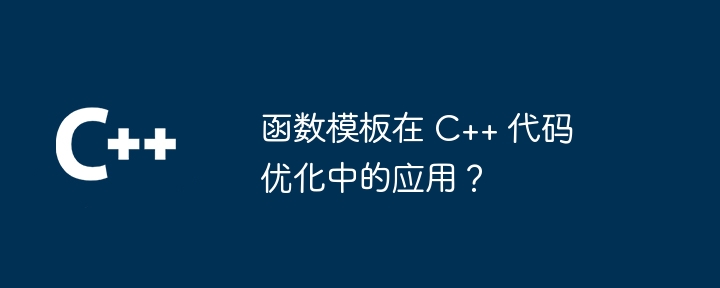
Function templates improve code reusability by defining generic functions, thereby optimizing C code: Function template basics: Defining functions with generic type parameters allows the function to be applied to different data types. Practical case: The findMax function template can be used for any array type to find the maximum value, avoiding the duplication of code in writing functions of different data types. Performance optimization: Instantiating function templates of specific types supports compiler optimizations, such as inlining and eliminating virtual function calls, reducing function call overhead.

Application of function templates in C code optimization
Preface
Function Templates are a powerful C feature that allow you to create generic functions that can be used on different data types. By using function templates, you can eliminate duplicate code and improve code reusability. This article will explore how to apply function templates in C code optimization and provide practical examples.
Basics of function templates
Function templates use generic type parameters to define generic functions. These parameters can be used as parameters and return values of functions. The following is the syntax of the function template:
template <typename T>
T max(T a, T b) {
// 使用 T 作为函数参数和返回值的数据类型
return (a > b) ? a : b;
}In this example, T is a generic type parameter, which can be any data type. max Function template can be used for any data type because it can be instantiated to a specific type.
Practical Case
Suppose you are developing an application that needs to find the maximum value of an array of different data types. Using function templates, you can just write a function to handle any data type:
template <typename T>
T findMax(std::vector<T> arr) {
if (arr.empty()) {
throw std::invalid_argument("Array is empty");
}
T maxElement = arr[0];
for (auto it = arr.begin() + 1; it != arr.end(); ++it) {
if (*it > maxElement) {
maxElement = *it;
}
}
return maxElement;
} In this case, findMax The function template can be used for any array type with comparable elements. It uses an iterator to traverse the array and keep track of the maximum value.
Performance Optimization
Function templates not only improve code reusability, but also provide performance optimization opportunities. By instantiating function templates of specific types, the compiler can perform optimizations such as inlining, which can reduce function call overhead. Additionally, function templates can eliminate virtual function calls, which create additional overhead.
Conclusion
Function templates are a powerful tool that C developers use to optimize their code. By using function templates, you can create generic functions, making your code more reusable and improving performance. This article introduces the basics of function templates and provides how to apply them in a practical case to find the maximum value of an array.
The above is the detailed content of Application of function templates in C++ code optimization?. For more information, please follow other related articles on the PHP Chinese website!
 What are the differences between c++ and c language
What are the differences between c++ and c language
 Recommended learning order for c++ and python
Recommended learning order for c++ and python
 Cost-effectiveness analysis of learning python and c++
Cost-effectiveness analysis of learning python and c++
 Is c language the same as c++?
Is c language the same as c++?
 Which is better to learn first, c language or c++?
Which is better to learn first, c language or c++?
 The difference and connection between c language and c++
The difference and connection between c language and c++
 C++ software Chinese change tutorial
C++ software Chinese change tutorial
 Cost-effectiveness analysis of learning python, java and c++
Cost-effectiveness analysis of learning python, java and c++




